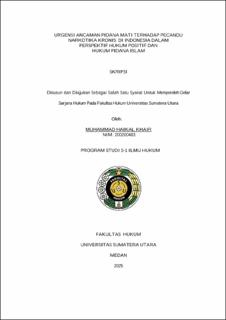Urgensi Ancaman Pidana Mati terhadap Pecandu Narkotika Kronis di Indonesi Perspektif Hukum Positif dan Hukum Pidana Islam
The Urgency of the Death Penalty Threat Against Chronic Drug Addicts in Indonesia from the Perspective of Positive Law and Islamic Criminal Law

Date
2025Author
Khair, Muhammad Haikal
Advisor(s)
Ekaputra, Mohammad
Nurmalawaty
Metadata
Show full item recordAbstract
Indonesia is in a state of narcotics abuse emergency. Narcotics on the one hand are drugs or materials that are useful in the field of treatment or health services and the development of science used in Indonesia. Besides narcotics being used as a drug on the other hand, many abuse it so that it becomes a narcotics abuser and damages the successor of the nation and state. Islamic criminal law can be used as a reference in the future development of criminal law against narcotics abusers. The problems discussed in this thesis are how the regulation of narcotics in Indonesia based on Law Number 35 of 2009 and Regulation of the Minister of Health of the Republic of Indonesia number 5 of 2023 and number 30 of 2023, and how the regulation of narcotics according to Islamic law in the form of the Koran, hadith, and ijma ulama, how the effect of rehabilitation measures and imprisonment on chronic narcotics addicts and the Urgency of the death penalty against chronic narcotics addicts in Indonesia
The method used in writing this thesis is the normative jurisprudence method, this is the method that refers to legal norms carried out by means of library study in order to obtain secondary data m of primary, secondary and tertiary legal materials related to the problem studied. Sources of data obtained through legislation, books, scientific journals, and library research.
Research results indicate that the urgency of the death penalty threat against chronic drug addicts must be implemented immediately due to the increasing number of drug addicts each year and the lack of impact from rehabilitation and imprisonment on chronic drug addicts. Article 54 of Law No. 35 of 2009, which mandates rehabilitation for users, results in potential and actual drug users perceiving drug use as easy because of the light penalties imposed and only rehabilitation measures. Therefore, the presence of the death penalty threat is expected to serve as a preventive step for potential and actual drug users. In Islamic law, the death penalty for drug addicts who repeatedly commit the act (recidivists) is permissible through ta'zir punishment to provide education. Many countries that have implemented the death penalty for drug users and addicts have seen a significant decrease in recent years, such as Saudi Arabia, which can thus be used as a reference in the development of narcotics law.
Collections
- Undergraduate Theses [3142]
